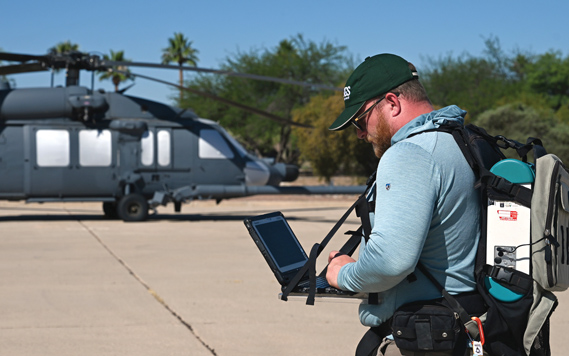MOUNTAIN HOME AIR FORCE BASE, Idaho (AFNS) — Cybercrime is the fastest growing and most dynamic area of crime. Ever-increasing reliance on cyber technology is allowing criminals to operate with virtual impunity across a range of criminal activities and jurisdictions.
Although the types of crimes are not necessarily new (theft, fraud, extortion, drug proliferation and sex-based exploitation), the technology provides criminals an unprecedented range of targets, increased operational capabilities and a reduced risk of capture and prosecution.
In 2013, cybercriminals defrauded the U.S. public to the tune of more than $780 million through a variety of online scams ranging in a level of complexity from simple fraud schemes to complex hacking scams, according to the 2013 Internet Crime Report, FBI. In the past few years, there have been numerous online scams where criminals have either directly targeted military personnel or used actual and fictitious information about U.S. military members to defraud the public. These scams range in forms and all are designed to extort information or money from innocent victims by exploiting the public’s trust in the U.S. military.
Online scammers use U.S. military members’ information, whether real or fake, for three reasons: 1 – credibility; 2 – plausibility; and 3 — emotional appeal. Appearing attractive to a victim’s emotional response the criminal generates trust and loyalty in order to increase credibility once the scam is suggested. The military ties also give criminals a credible reason to solicit money from victims that would normally make such a request seem suspicious. Two of the most common online scenarios are sale scams and the Nigerian Letter scams.
Online sale scams: The scam begins by offering online goods well below their market price, most frequently carried out on an online sale site. Most of such scams involve vehicle sales and generally take the following pattern: a scammer advertises a vehicle for sale at a price almost too good to be true and describes the vehicle in broad terms. The potential victim answers the ad and is soon contacted by the scammer, claiming to be a member with a U.S. military unit that’s being deployed abroad. The scammer uses this “deployment” to explain the devalued sales price of the vehicle and they will be unable to test drive it. Often, the scammer insists the transaction take place quickly and requests the potential victim wire the money or transfer funds via the purchase of a money card and then providing the code to the scammer.
Advance-fee online fraud scam or Nigerian Letter scams: Seeks to defraud potential victims by promising big profits in exchange for help moving large sums of money. Claiming to be a government official, business person or the surviving spouse of a former government leader, the criminals offer to transfer millions of dollars into victim’s bank account in exchange for a small fee. The scammer really wants the victim’s bank account information in order to transfer money out of their account.
Air Force personnel appear to be at risk to online impersonation because of the perceived reputability and integrity of service members by the general public. Criminals looking to impersonate service members can find an abundance of personal information from official websites, news articles and social networking sites. Air Force members should be aware their personal information can be exploited by online imposters and must remain vigilant to protect and minimize their Internet footprint.











